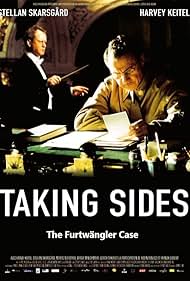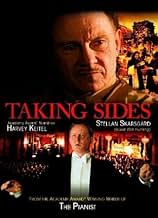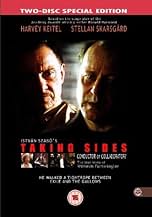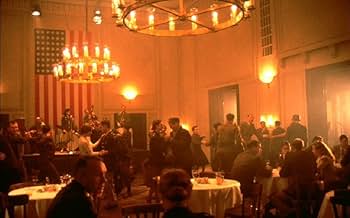After the end of World War II, a famous German conductor is accused of loyalty to the Nazi regime. He argues that art and politics are separate. An investigator thinks otherwise.After the end of World War II, a famous German conductor is accused of loyalty to the Nazi regime. He argues that art and politics are separate. An investigator thinks otherwise.After the end of World War II, a famous German conductor is accused of loyalty to the Nazi regime. He argues that art and politics are separate. An investigator thinks otherwise.
- Awards
- 9 wins & 3 nominations total
Featured reviews
The Major pursues Furtwangler like a rabid dog, determined to show that that Furtwangler was guilty of something.Why didn't Furtwangler leave when he had the chance? Did he seek out accolades from the devil?
Why is Major Arnold so Angry? It it the anger of a small man who feels spat upon by life, suddenly given the chance of bring down someone once so High and Mighty?
FurtWangler is aloof, distant, full of easy platitudes about the redemptive quality of Art. Major Arnold is mean and streetwise, quick to attack and condemn those who he does not understand.
Who is in the wrong? In the end does it mean anything to believe you are right? In whose eyes anyway? This film asks some difficult questions about how we perceive ourselves and others, how we question our most basic motives. Very Good.
The film is the story of the investigation by the American post-war authorities to decide whether the accusations of collaboration are valid. The film presents two ethical answers. The first one is stated by the American officer (played excellently by Harvey Keitel), who believes that Furtwängler is morally guilty, as he accepted a shining career from the Nazi's hand. The second answer is presented by Furtwängler himself who tries to defend himself by stating that in order to help (by "help" he both meant practical assistance - as he did save many Jews during the war - and a spiritual message - as he claimed that his music maintained the inner good in his nation's soul even in the time of Evil) he had to compromise with the Nazis, but he never really collaborated with them. The film itself (despite its title) does not take side, although it seems to sympathize with Furtwängler as an artist and generally presents the American officer as an ignorant and illiterate person. However, as the investigation proceeds, this aggressive and obnoxious person asks questions that are very hard to answer: is it acceptable to make such a compromise with a regime that kills 6 million Jews? Is it really so that Furtwängler made the compromise with the idea of helping people in need? Or rather, did he make it to advance his career?
The film has triggered exciting conversations with my friends who have differing opinions. I think these lengthy talks are the best proof that this is an excellent film and it has achieved its aim.
The story has several layers (I particularly liked the way differences of American and German cultures are presented), the characters are exciting and well played: if you like thought-provoking movies, go for this one!
But, as another person here has said, one of the great things about this movie is that it will start arguments.
What I'd like to note is that this is a film of a dying breed. It is truly educational and stimulates our systematically dumbed down intellect ( as also Szabo's older film "Mephisto" ). It's when reading the comments of other viewers that one realizes that there are still people out there that can appreciate film as a vehicle of dialectic and whose insightful observations add to our collective learning experience. Thank you.. it is SUCH a pleasure to read your comments.
dvoulio
Did you know
- TriviaTo the criticism of both movie critics and American audiences of depicting the American Denazification officer Maj. Steve Arnolds (Harvey Keitel) as a "caricature, a bully, a Philistine," screenplay writer Ronald Harwood told The Jewish Journal that he went on to comb archives for denazification transcripts and to interview officials who had supervised such proceedings."They were morally brutal," Hardwood stated. "They bullied people, and they did behave in an extreme way. But they had just seen the camps, and no one in the world had seen that before."
- GoofsWhen Major Arnold is listening to the recording of Beethoven's Fifth Symphony, the record finishes the first movement and carries straight on to the second. Long playing albums, which ran at 33 1/3 rpm, were introduced in 1948, but the record shown is a 78 rpm one. The performance of the 5th Symphony would have been on a set of five 78 rpm records, one movement each, split over the two sides. It should not be possible for the second movement to start without the record being changed.
- Quotes
Emmi Straube: When he made his decision, he couldn't have known everything. Especially not the way people like you do, who've returned from exile and feel that you have a right to pass judgement. Because you are blameless, you think you know best who is a sinner and who deserves forgiveness. But you have no idea how people lived here.
- ConnectionsEdited into Taking Sides Again (2004)
- How long is Taking Sides?Powered by Alexa
Details
- Release date
- Countries of origin
- Languages
- Also known as
- Думки сторін
- Filming locations
- Production companies
- See more company credits at IMDbPro
Box office
- Budget
- $20,000,000 (estimated)
- Gross US & Canada
- $188,952
- Opening weekend US & Canada
- $22,051
- Sep 7, 2003
- Gross worldwide
- $422,832
- Runtime1 hour 48 minutes
- Color
- Sound mix
- Aspect ratio
- 1.85 : 1
Contribute to this page



































